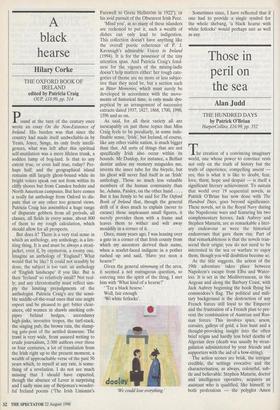A black hearse
Hilary Corke
THE OXFORD BOOK OF IRELAND edited by Patricia Craig OUP, £18.99, pp. 514 Pound at the turn of the century once wrote an essay On the Non-Existence of Ireland. His burden was that since the country had made itself undwellable-in by Yeats, Joyce, Synge, its only lively intelli- gences, what was left after this spiritual self-mutilation was a mere lifeless trunk, a sodden lump of bog-lard. Is that to any extent true, or even half true, today? Per- haps half; and the geographical island remains still largely ghost-bound while its bright voices speak out not from within its cliffy shores but from Camden bedsits and North American campuses. But here comes a really fat anthology from Oxford to dis- pute that or any other too general views. Patricia Craig has assembled a huge range of disparate gobbets from all periods, all classes, all fields in every sense, about 800 of them to my rough calculation, which should allow for all prospects.
But does it? There is a very real sense in which an anthology, any anthology, is a lim- iting thing. It is and must be always a strait- jacket, even if, by oxymoron, a roomy one. Imagine an anthology of `England'! What would that be like? It could not sensibly be done, the subject is too vast: an anthology of 'English landscape' if you like. But is then 'Ireland' so relatively small? Not real- ly; and any chrestomathy must reflect sim- ply the limiting prejudgments of the anthologist. Patricia Craig's are the sensi- ble middle-of-the-road ones that one might expect and be pleased to get: bitter clear- ances, old women in shawls smoking cob- pipes behind hedges, ascendancy high-jinks, inventive tropes, the turf-stack, the singing pub, the brown rain, the slump- ing gate-post of the nettled demesne. The trawl is very wide, from assured writing to crude journalism, 2-300 authors over three or four centuries, a lot of translation from the Irish right up to the present moment, a wealth of approachable verse of the past 50 years which, to myself at any rate, is some- thing of a revelation. I do not see much missing that I should have expected, though the absence of Lever is surprising and I sadly miss any of Betjeman's wonder- ful Ireland poems (The Irish Unionist's Farewell to Greta HellstrOm in 1922'), or his avid pursuit of the Obscurest Irish Peer.
`Mind you', as so many of these islanders are reckoned to put it, such a wealth of dishes can only lead to indigestion. This collection doesn't have anything like the overall poetic coherence of P. J. Kavanagh's admirable Voices in Ireland (1994). It is for the possessor of the tiny attention span. And Patricia Craig's fond- ness for the vigours of the mixing-ladle doesn't help matters either: her rough cate- gories of theme are no more or less subjec- tive than they need be, but a section such as Bitter Memories, which must surely be developed in accordance with the move- ments of historical time, is only made dys- peptical by an arrangement of successive extracts dated 1937, 1827, 1868, 1700, 1990, 1596 and so on.
As said, for all their variety all are inescapably on just those topics that Miss Craig feels to be peculiarly, in some inde- finable sense, 'Irish', but Ireland, of course, like any other viable nation, is much bigger than that. All sorts of things that are not specifically Irish also occur within its bounds. Mr Dunlop, for instance, a Belfast dentist unless my memory misguides me, invents the inner tube for the bicycle, but his ghost will never find itself in an 'Irish' anthology. Those so much less valuable members of the human community than he, Adams, Paisley, on the other hand . . . . But it has firmly to be said for The Oxford Book of Ireland that, though the general drift of it does much to explain (never to excuse) these unpleasant small figures, it merely provides them with a frame and leaves them to wither and wilt away mouldily in a corner of it.
Once, many years ago, I was leaning over a gate in a corner of that Irish county from which my ancestors derived their name, when a scarlet-faced indigene in a pother rushed up and said, 'Have yez seen a hearse?'
Given the general stimmung of the area, it seemed a not outrageous question, so entering into the spirit of the thing, I met him with 'What kind of a hearse?'
"Tez a black hearse.'
Well, fair enough.
`Wi white fetlocks'.
'We could lose everything.' Sometimes since, I have reflected that if one had to provide a single symbol for the whole shebang, 'a black hearse with white fetlocks' would perhaps suit as well as any.
























































 Previous page
Previous page